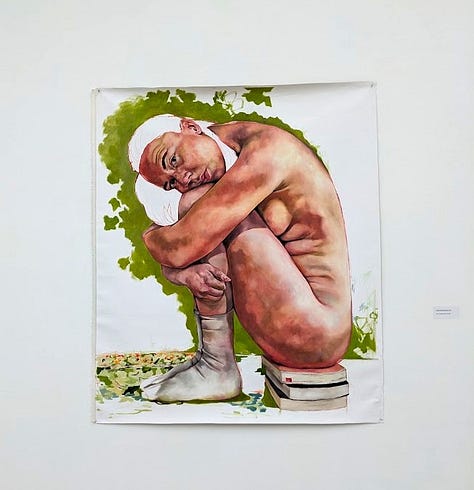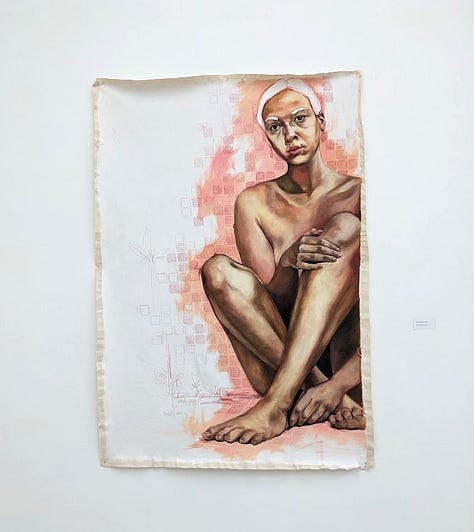🧭 Cultural Compass #17
A round-up of culture influencing my navigation of life: The Female Body
Hello to new subscribers! Welcome (back) to the ‘Cultural Compass’ series of The Navigation, where each month I share a round-up of recently consumed culture (usually books, podcasts, articles; sometimes TV, and other miscellaneous items) that’s in some way had an impact on my thinking around navigating life.
Maybe something that’s caused me to reflect on an aspect of my life I want to change, something I want to strive for, a daily routine ‘hack’, or something that I just feel compelled to share, relating to the themes I’m thinking and writing about.
🖼️ Body and Flesh
I wasn’t sure how I wanted to frame the theme of this month’s Cultural Compass, but I knew I wanted to share Sofia Laskari’s Body and Flesh exhibition, currently showing at the Saatchi Gallery in London.
I considered a delve into the art world, as this show made me think and feel things discussed in a recent
podcast (that I briefly featured in!) specifically relating to art not needing to make us feel comfortable or joyful. I also thought about focusing on the successes of young women, astounded as I was upon finding out Laskari is only 21; to me the images had felt so mature. But on a browse through my list of things saved for sharing via Cultural Compass, and reflecting on what I’d been consuming lately (no doubt influenced by the fact that summer is, in theory, upon us), a focus on the female body felt like a good place to land - especially given how carefully yet vibrantly it is depicted in Laskari’s work.Using oil in unstretched canvas, each nude in the collection portrays the skin as having not one colour, or a slight variation in tone, but a multitude of hues that gives the work a real sense of vitality. Even more so perhaps as the female bodies often sit against a vibrant background or on delicately patterned blankets. Though inherently mesmerising, the images aren’t intended to portray beauty, but rather challenge; particularly challenges we face as individuals.
As I walked around the room - a vast white rectangular space, neatly laced with portraits on all four walls - emotions ebbed and flowed. Some pieces I felt I could really resonate with; I felt myself in those postures and positions. Others felt inspiring. Invigorating. Others still felt too jarring to spend time with, the pain and anguish almost too much to bare, even as I stood in the safety of an onlooker.
I don’t feel I know enough about art, or the art world, to know how unique or fresh these images are in comparison to work by peers, present or past. But they felt new to me. A new take on the female body. How it looks. How it feels. How it contorts. And whether it’s an enjoyable take or not doesn’t really matter.
The exhibition is free, but only on until June 9th - today! - so if you’re stuck for afternoon plans, I can recommend a trip down to Sloane Square (where you can also make the most of the other free exhibits currently showing).



📑 Health and the Self
Next up, a Time article that’s been lingering in my ‘saved to share’ notes section for months. Titled, Self-Silencing Is Making Women Sick, the piece explores how women’s tendency to not speak up about how we’re really feeling - physically and/or mentally - can have a real physiological affect on us. The author, psychologist Maytal Eyal, opens by highlighting how “our culture rewards women for being perpetually pleasant, self-sacrificing, and emotionally in control,” and that in her work she asserts that women’s health may actually depend on going against these norms.
Research is cited linked to self-silencing contributing to chronic conditions, serious health concerns, and even premature death - particularly when women were not expressing themselves fully in arguments with a partner! That latter example I feel may need to be taken with a pinch of salt, but all this to say that, it’s not just difficulties in getting diagnoses for ‘women’s issues’ such as endometriosis that we often face, but that wider norms, or things we have been conditioned to feel or think, are making the female body unwell too.
This is not news to me. I have had my fair share of encounters with the medical profession, not least a period of illness some years ago that involved becoming extremely well acquainted with that particular scent of a hospital, no doubt made worse by the length of time it took for someone to really understand what I was saying and look into what was going on with my unwell body. Not to sound dramatic, but the whole experience was in many ways quite life-changing, and I’ve long thought about delving into it more here (and may actually do so in the near future after all the encouragement to write more vulnerably at a lovely Substack gathering recently!). Moreover, I live with a chronic condition that I almost never talk about - even with those close to me - and that itself is made worse by many of the kinds of actions and thoughts referenced through the Time article. Being a better advocate for myself, and my body, is something I’m getting better at, but it still needs work.
I don’t think this a female-only issue though, and while the research may lean more heavily that way, I’m sure self-silencing is not having a great impact on anyone’s body.
I’ll let you ponder how you might take better care of yours…
🎧 Wellness on a Walk
Somewhat linked to points shared in the article, an episode of The Everygirl podcast exploring nutrition, hormones, and wellness routines with registered dietitian, Valerie Agyeman. I find The Everygirl podcast generally to be a bit of a mixed bag, but do enjoy it when I’m off on a (hot girl) walk (lol) and need a bit of that all American girl energy. This episode I listened to recently struck me in how it was a reminder of so many shared experiences of being in this world as a woman, with a body, and all the annoying complexities that entails.
Agyeman talks of how she got into the wellness landscape through wanting to breakdown traditional norms and practices women have often held around their bodies, and support the development of a more holistic understanding of and approach to health. The impact of food/calorie-tracking apps, the lack of education around key issues affecting women’s bodies - from peri-menopause to bone health to hormones interacting with the pesky gut-brain axis - and what it really means to be nourished, were key points highlighted through the episode.
As well as acting as a bit of an intro to nutrition (beyond green smoothies), there’s also a few top tips for easy switches or additions to build into whatever your already eating (though I personally won’t be blending sardines into a sauce), plus encouragement to scrap the idea that wellness routines need to be a strict daily schedule, and can instead be more of a pic’n’mix - which felt like a nice nod to something else I wrote recently.
On the whole in this episode there is a sense that we should make food, movement and our general approach to our bodies fun and enjoyable. If there’s one thing I can get on board this summer, I’ll let it be that.
📑 BONUS: As regular readers will know, I usually stick to three recommendations per round-up, but this time I’ve felt compelled to share just a little something more. I recently read this piece from
on the concept of “sweetheart lingerie” and how even things merely related to women’s bodies still get caught up in the spoils of war. Honestly, I felt pretty sickened reading the article, which I came across via (in the same newsletter she shared fascinating insights into the notion of tradwives), but also captivated by how Chen took a topic I associate with endlessly depressing news headlines, and my university studies in international politics, and blended it with fashion journalism in a way that likely brought something new to a regular audience.I don’t write much about politics or current affairs on
, usually because I feel others are already sharing more nuanced takes on serious topics than I back myself to be able to, despite them consuming much of my brain and being a hot topic in conversations with friends. There is also the worry that if I say something about one thing and not another, I’ll be seen to ignore what is happening over there, when that’s highly unlikely to ever be the case in reality.But there’s so much more we can do than write online about a tragedy that is troubling us, such as volunteering our time, donating our money, writing to our politicians (though, despite getting a very enthusiastic response from mine on the issue of a ceasefire in Gaza, we are where we are), protesting, petitioning, cooking extra food for those who need it, or exploring new, creative ways to support a good cause.
The latter is what a good friend of mine landed on, and over the past few months has gathered with a group of women to engage in art therapy as they’ve created beautifully designed keychains with a heartfelt backstory behind the concept. Each keychain costs £5, and all the proceeds go to Medical Aid for Palestine (MAP), as they’re covering the costs themselves. Check out this Instagram post to learn more, and how to purchase one if you’d like to support the cause. 🍉
If you liked this piece and are keen to show some support without a paid subscription, a Ko-fi coffee is always so appreciated - but any donations from this week’s piece will go to the MAP fund.





Excuse me. Did you venture to SW6 and NOT look me up? Rude Lauren. Rude. 😂
Lovely piece and will be checking out the pods ❤️
❣️